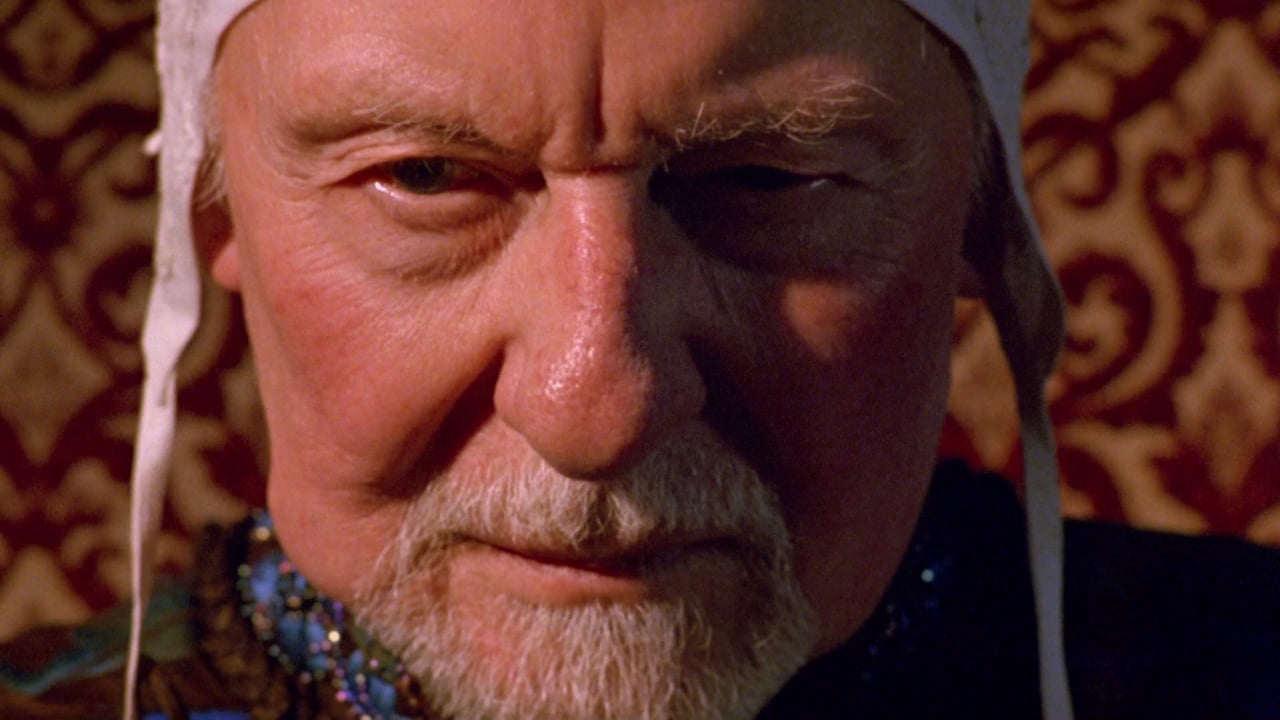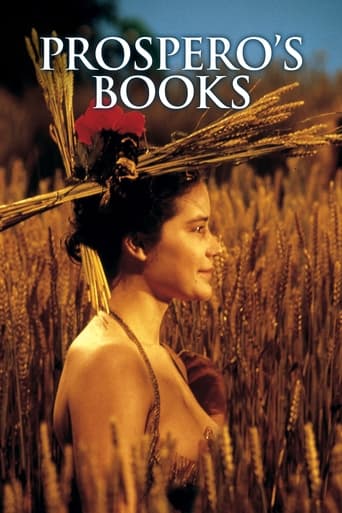

This Movie Can Only Be Described With One Word.
... View MoreIt is a performances centric movie
... View MoreThe performances transcend the film's tropes, grounding it in characters that feel more complete than this subgenre often produces.
... View MoreThis is a must-see and one of the best documentaries - and films - of this year.
... View MoreOn the first sight this is one of numerous attempts to make a Shakespeare movie. Yes, it looks rather like a spectacle than a film. First impression is that it is a very-very strange movie. Actors are deliberately artificial. Make up is intentionally thick. Gestures are exaggerated. People are silent. You hear music and reader's voice. I thought watching it - what's it exactly? A try to say a new word on a topic which is equal to four hundred years?.. Try to say a new word of it, just try, okay.Time passed. Several years.By the time a new adaptation of 'Tempest' appeared, with Helen Mirren as Prospero. And what's the matter? I found that I can not watch another 'Tempest' shot by any other director. All of them look like wrong, WEAK and stupid. All of them look like fakes. (I love Helen Mirren, I adore her works and her appearance in every film is welcomed by me. But not in 'Tempest' - and it is not her fault.)Wow, I thought, what a surprise! The movie by Peter Greenaway - for me - is the Best 'Tempest' I have ever seen - and I'm afraid - I will ever see. It is so right as it can be. The text is a pure contradictory fantasy of the poet and Mr. Greenaway makes it into reality, breathes a life into it showing it with all means which do not offer ready images for us and, on the contrary, he turns a spectator's imagination on and involves us into a game with images. Do you know such another director or another film which makes it with a spectator? It is closer to a real Globe staging. It is a miracle. And it is a fantastic masterpiece. Do I recommend it to everyone? I don't. It is very-very specific. It is not for everyone. Just like something collectible, something valuable, rare and fragile. Something you would prefer not to show for everyone not to break an atmosphere around it. And it takes several years to understand what it really IS. Just like in life ... when you live and do something whatever, and then several years later you suddenly catch your thought that it was a happiest time in your life. So this film is something of that kind (for me). You may understand what it IS not immediately after watching.
... View More"The Tempest", in a sublime way, is both about itself and us, giving us a role inside the play itself and at the same time the opportunity to experience it from the outside; strongly about the art of telling stories and creating reality through them, Prospero is a wonderful archetype of a narrator.What Greenaway gives me is different yet much alike from what for example Tarkovsky gives, which may sound absurd considering the styles of film-making: the theatrical visual exuberance of Greenaway with overlaid images scarcely brings to mind the ethereally lingering camera shots of a Rublev or a Nostalghia. But if we go further, we notice that they are both as adventurous, going far away the horizon to uncharted visual territory. "The Pillow Book" (1996), although equally exuberantly visual, is far more accessible, and perhaps my favourite "Late Greenaway". Not that this doesn't have everything going for it, it is rather serious stuff. Sure, this is pompous and there are moments I'd rather shortened, and by the time we reach the wedding one, at least this particular viewer feels rather drained out. But this is so remarkably wonderful visually and deeply rich in its understanding/interpretation of Shakespeare that it doesn't really matter, but in other later Greenaways I don't feel as strongly about, this lack of deep-rooted humour makes them bothersome to watch. With "Prospero's Books" I'm more forgiving, I suppose, but as with some other amazing films ("A torinói ló" from 2011, for example), it can be tough to sit through.A notable thing, Michael Nyman's music. A wonderful experience on its own, Nyman's compositions have the power to amplify and annotate the images we see, and the effect works both ways. Curiously the music is taken from Nyman's "La Traversée de Paris". And the dancing is superb, as well as Sacha Vierny's work, that is, how it dwells in the space that surrounds it.I don't think it's easy to find a proper DVD of this, let alone a Blu-ray. I have this on an Italian DVD that, unfortunately, has only the dialogue in Italian, as well as a DVD released in Scandinavia. It's not amazing by any means, but I'm glad it exists. The back cover of the DVD has one of the funniest things I've seen. It actually states that the film has been directed by "the four-time Academy award winner Peter Greenaway".
... View MoreIt's a challenge to come up with a description that conveys the abomination that this film is. I think "cinematic holocaust" sums it up. This film is offensive, painful, shameful and a blight on the face of human history.If you've actually read Shakespeare (and not just read the cliffs notes to pass your 8th grade English exam), you will sense right away that this "adaptation" has absolutely no connection to the lyrical masterpiece. For one thing, I don't think Shakespeare had fat, naked people prancing around the stage yelling "Boatswain!" for no reason.Peter Greenaway should've really been a porn director; he seems to have so much sexual frustration built up in his little noodle. As far as artistic expression, I think I've seen more compelling visuals in the radiogram of a fart.
... View MoreOnce upon a time, Peter Greenaway was considered a serious artist. 1991's Prospero's Books ended that. To understand this, let's remember that in the 1960s and 1970s, Greenaway became known for some witty, short films playing with several of his obsessions, like counting, classification, sexuality, etc. He graduated to feature length films in the 1980s: after the (unwatchable) The Falls, he made a series of fine, intelligent, cerebral (if sometimes hard to take) art movies: The Draughtsman's Contract, A Zed and Two Noughts, The Belly of an Architect, Drowning by Numbers. These four movies, made back to back, are his best in a 40-plus year career. Then, in 1989, came The Cook, The Thief, his Wife and Her Lover, his most successful film so far, and a truly success de scandal, with his brilliant but often shocking images. After The Cook, everyone called him a genius, and he might have believed those accolades, since right after that he made one of the most self-indulgent (and unwatchable) films ever made: Prospero's Books. An adaptation (for lack of a better word) of Shakespeare's The Tempest, made at the request of its star, the octogenarian John Gielgud (who have played the part of Prospero on stage, and had unsuccessfully asked a number of prominent directors to bring the play with him to the screen), this film is truly terrible: shot entirely on a sound stage, is a parade of naked people, awful use of digital imagery (which has rapidly look obsolete with the passage of time), and poor old Gielgud speaking all the parts (!). The movie looks as the filming of a Shakespeare play as made by an idiot savant, except that this idiot doesn't even look here to be very savant. Not surprisingly, few people liked Prospero's Books. After this fiasco, Greenaway has continued making movies, as well as exhibitions for museums, but with the exception of The Pillow Book, almost no one has watched them, or care for them.
... View More